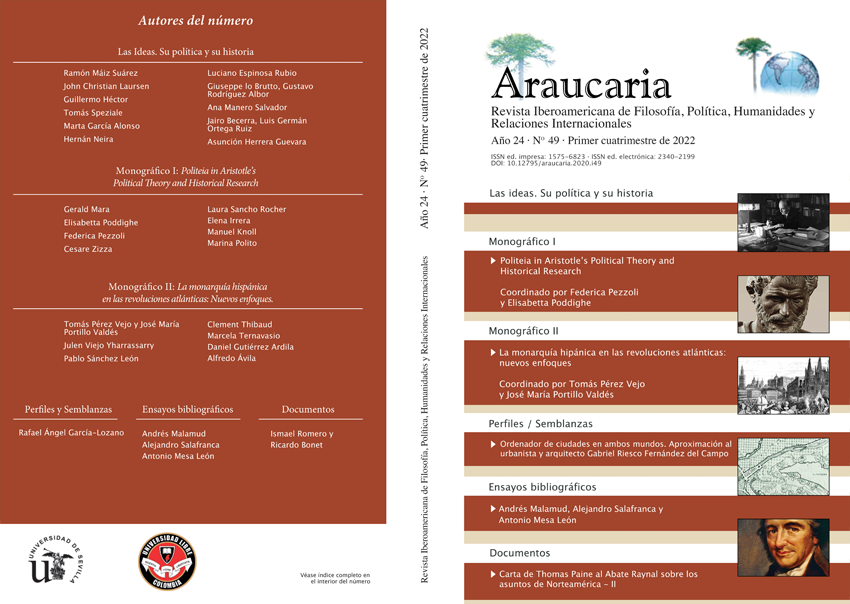Lost illusions in Interwar Europe: nation and self in Robert Musil
DOI:
https://doi.org/10.12795.01Palabras clave:
Nationalism;, nationalities, Austro-Hungarian Empire, Robert Musil, collective identityResumen
The work of Robert Musil Der Mann ohne Eigenschaften is not only considered one of the heights of the twentieth century novel, but also constitutes an essay of deep political theoretical depth on the nation and nationalism in interwar Europe. The crisis of the Austro-Hungarian Empire serves as the reason for the author to develop a deep critique of some of the fundamental theoretical foundations of modern political thought. This article shows how the systematic criticism to which essentialist and racist nationalism is subjected in the work is based on a review of two of the philosophical assumptions that make it possible: the linear conception of time and history, and the metaphysics of the subject. The analysis explores the deep relationship that exists in the work between individual identity (the subject) and collective identity (the nation), between the crisis of the modern unitary subject as an autonomous individual and the difficulties of the construction of a pluralist and democratic concept, inclusive of Nation.
Descargas
Citas
Andreas-Salomé, Lou & Rilke, Rainer Maria Briefwechsel. Zürich und Wiesbaden: Max Niehans Verlag und Insel-Verlag, (1952).
Bauer, Otto, Die Nationalitätenfrage und die Sozialdemokratie. En N. Ephraim (Ed.). The question of nationalities and social democracy (Minnesota: University of Minnesota Press, 1907).
Bahba, Homi K. (Ed), Nation and narration (London: Routledge, 1990). https://doi.org/10.4324/9780203823064
Böhme, Hartmunt, Anomie und Entfremdung (Regensburg: Scriptor Verlag, 1974).
Bringazi, Friedrich, Robert Musil und die Mythen der Nation (Berlin: Peter Lang, 1998).
Broch, Hermann, Hugo von Hofmannsthal and his time (Chicago: Chicago U. Press, 1984)
Broch, Hermann, Der Tod des Vergi, (Frankfurt: Suhrkamp, 1986).
Broch, Hermann, Die Schlafwandler (Frankfurt: Suhrkamp, 1986).
Cacciari, Massimo, Dallo Steinhoff. Prospettive viennesi del primo Novecento (Milan: Adelphi, 1980).
Claire, Jean (Ed.), Apocalypse joyeuse (Paris: Centre Pompidou, 1983)
Fejto, François, Requiem pour un empire défunt. Histoire de la destruction de l'Autriche-Hongrie (Paris: Perrin, 2014).
Frank, Manfred, Gott im exil (Frankfurt: Suhrkam, 1998).
Gay, Peter, Schnitzler's century, (New York: Norton, 2001).
Hickman, Hannah, Robert Musil and the culture of Vienna, La Salle (ILL.): Open Court. (1991).
Hinz, Michael. Verfallanalyse und utopie (Röhrig: Saarbrüken, 2000).
Janik, Allan, y Toulmin, Stephen, Wittgenstein´s Vienna (Nueva York: Simon & Schuster, 1973).
Jonsson, Stefan, Subject without nation, Robert Musil and the history of modern identity (Durham: Duke U. Press., 2000), https://doi.org/10.1215/9780822398257
Kristeva, Julia, La révolution du langage poétique, (Paris: Seuil, 1974).
Latraverse, François y Moser, Walter, (Eds.), Vienne au tournant du siècle (Paris: Albin Michel, 1988).
Leersen, Joep, Nationalism and the cultivation of culture, Nations and nationalism 12(4), 559-578, (2006), https://doi.org/10.1111/j.1469-8129.2006.00253.x
Leersen, Joep, Cultural mobility and political mobilization: Transnational dynamics, national action. En X.M. Núñez-Seixas (Ed.). The First World War and the nationality question in Europe (17-37). (Leiden: Brill, 2020).
Lewis, Pericles, Modernism, Nationalism, and the novel (Cambridge: CUP, 2000).
Lukács, Georg, Die Theorie des Romans (Bielefeld: Aisthesis Verlag., 2016).
Luft, David, S., Robert Musil and the crisis of european culture (Berkeley: California U. Press, 1980).
Magris, Claudio, Il Mito absburgico nella letteratura austriaca moderna (Turin: Einaudi. 1963).
Magris, Claudio, Lontano da dove (Torino: Einaudi. 1971).
Magris, Claudio, Itaca e oltr. (Turin: Einaudi. 1982).
Magris, Claudio, L’anello di Clarisse (Torino: Einaudi. 1999).
Máiz, Ramón. y Pereira, María, The idea of nation as plural community and the question of territorial and non-territorial autonomy in Otto Bauer. Philosophy and Society, 31 (3), 287-301, (2020), https://doi.org/10.2298/fid2003287m
Martens, Gunther, Beobachtungen der moderne in Hermanns Broch und Robert Musil (München: Wilhelm Fink., 2006)
Marramao, Giacomo, Austromarxismo e socialismo de sinistra fra le due guerre (Milan: La Pietra. 1977).
Molnár, Miklós y Reszler, André (Eds.), Le Génie de L’Autriche-Hongrie (Paris: PUF., 1989).
Moretti, Franco, The way of the world. The Bildungsroman in European culture (London: Verso. 1987).
Moretti, Franco, Atlante del romanzo europeo 1800-1900 (Turin: Einaudi, 1997).
Morgenstern, Soma, Joseph Roths Flucht und Ende: Erinnerungen (Köln: Kiepenheuer & Witsch, 2008).
Musil, Robert, Der Mann ohne Eigenschaften. Erstes un zweites Buch (Hamburg: Rowohlt, 1978, 2003).
Musil, Robert, Tagebücher (Hamburg: Rowohlt, 1983).
Musil, Robert, Prosa und Stücke (Hamburg: Rowohlt, 2000).
Nimni, Ephraim, Minorities and the limits of liberal democracy. En T. H. Malloy y Palermo F. (Eds.), Minority acommodation (73-98). (Oxford: Oxford U. Press., 2015).
O’Brien, Eugene, The question of Irish identity in the writings of W.B. Yeats and James Joyce (New York: Edwin Mellen, 1998).
Parrinder, Patrick, Nation and novel (Oxford: Oxford U. Press, 2006).
Rezzori, Gregor, An Ermine in Czernopol (New York: New York Review of Books, 2012).
Rezzori, Gregor, Der Tod meines Bruders Abel (Munich: Goldmann, 1990).
Ricoeur, Paul, Soi-même comme un autre (Paris: Seuil, 1990).
Rogowsky, Christian, Distinguished outsider, Robert Musil and his critics (Columbia: Camden House, 1994).
Roth, Joseph, Radetzkymarsch (Berlin: DTV, 2001).
Roth, Joseph, Flucht ohne ende (Berlin: Hofenberg, 2015).
Schorske, Carl, E., Fin-de-siècle Vienna: Politics and Culture (New York: Knopf, 1979).
Timms, Edward, Karl Kraus. Culture and catastrophe in Habsburg Vienna (New Haven: Yale U. Press., 1986).
Tschiggerl, Martin, Significant otherness nation-building and identity in postwar Austria. Nations and Nationalism, 1-15, (2020), https://doi.org/10.1111/nana.12677
Descargas
Publicado
Cómo citar
Número
Sección
Licencia
Las ediciones impresa y electrónica de esta Revista son editadas por el Secretariado de Publicaciones de la Universidad de Sevilla, siendo necesario citar la procedencia en cualquier reproducción parcial o total.Salvo indicación contraria, todos los contenidos de la edición electrónica se distribuyen bajo una licencia de uso y distribución “Creative Commons Atribución-NoComercial-SinDerivar 4.0 Internacional”








